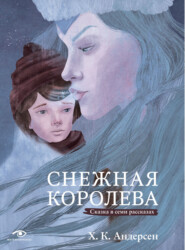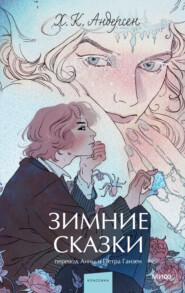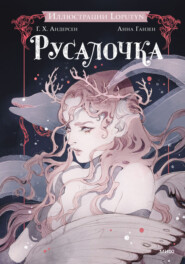По всем вопросам обращайтесь на: info@litportal.ru
(©) 2003-2024.
✖
Wonderful Stories for Children
Настройки чтения
Размер шрифта
Высота строк
Поля
Early the next morning the prince awoke, and was not a little amazed to find himself already high above the clouds. He sat upon the back of the eastwind, which kept firm hold of him. They were so high in the air, that the woods and fields, the rivers and sea, showed themselves as if upon a large illustrated map.
"Good-morning," said the eastwind; "thou mightest have slept a little bit longer, for there is not much to see upon the flat country below us, unless thou hast any pleasure in counting the churches, which stand like dots of chalk upon the green board."
They were the fields and meadows which he called the green board.
"It was very ill-mannered that I did not say good-by to thy mother and brothers," said the prince.
"There is no blame when people are asleep!" said the eastwind; and with that flew away faster than ever. One could have heard, as they went over the woods, how the trees shook their leaves and branches; one could have heard, on lakes and seas that they were passing over, for the billows heaved up more loftily, and the great ships bowed down into the water like sailing swans.
Towards evening, when it grew dusk, it was curious to look down to the great cities; the lights burned within them, now here, now there; it was exactly like the piece of paper which children burn to see the multitude of little stars in it, which they call people coming out of church. The prince clapped his hands, but the eastwind told him not to do so, but much better to keep fast hold; or else he might let him fall, and then, perhaps, he would pitch upon a church spire.
The eagle flew lightly through the dark wood, but the eastwind flew still lighter; the Cossack on his little horse sped away over the plain, but the prince sped on more rapidly by another mode.
"Now thou canst see the Himalaya," said the eastwind; "they are the highest mountains in Asia; we shall not be long before we come to the Garden of Paradise!"
With that they turned more southward, and perceived the fragrance of spice and flowers. Figs and pomegranates grew wild, and the wild vine hung with its clusters of blue and red grapes. There they both of them alighted, stretched themselves on the tender grass, where the flowers nodded, as if they would say, – "Welcome back again!"
"Are we now in the Garden of Paradise?" asked the prince.
"No, certainly not," replied the eastwind; "but we shall soon come there. Dost thou see the winding field-path there, and the great cavern where the vine leaves hang like rich green curtains? We shall go through there. Wrap thee in thy cloak; here the sun burns, but one step more and it is icy cold! The birds which fly past the cavern have the one, outer wing, in the warm summer, and the other, inner one, in the cold winter!"
"Really! And that is the way to the Garden of Paradise!" said the prince.
They now went into the cave. Ha! how ice-cold it was; but that did not last long, for the southwind spread out his wings, and they gave the warmth of the brightest fire. Nay, what a cavern it was! The huge masses of stone, from which the water dripped, hung above them in the most extraordinary shapes; before long it grew so narrow that they were obliged to creep upon hands and feet; again, and it expanded itself high and wide, like the free air. It looked like a chapel of the dead, with its silent organ pipes and organ turned to stone!
"Then we go the way of the dead to the Garden of Paradise," said the prince; but the eastwind replied not a word, but pointed onward, and the most lovely blue light beamed towards them. The masses of stone above them became more and more like a chiselled ceiling, and at last were bright, like a white cloud in the moonshine. They now breathed the most deliciously mild atmosphere, as if fresh from the mountains, and as fragrant as the roses of the valley.
A river flowed on as clear as the air itself, and the fishes were of gold and silver; crimson eels, whose every movement seemed to emit blue sparks of fire, played down in the water, and the broad leaf of the waterlily had all the colors of the rainbow; the flower itself was an orange-colored burning flame, to which the water gave nourishment, in the same manner as the oil keeps the lamp continually burning. A firm bridge of marble, as artistically and as exquisitely built as if it had been of pearl and glass, led across the water to the Island of Bliss, where the Garden of Paradise bloomed.
The eastwind took the prince in his arms and carried him over. The flowers and the leaves began the most exquisite song about his youth, so incomparably beautiful as no human voice could sing.
Were they palm trees or gigantic water plants which grew there? Trees so large and succulent the prince had never seen. Long garlands of the most wondrously formed twining plants, such as one only sees painted in rich colors and gold upon the margins of old missals, or which twined themselves through their initial letters, were thrown from tree to tree. It was altogether the most lovely and fantastic assemblage of birds, flowers, and graceful sweeping branches. In the grass just by them was a flock of peacocks, with outspread glittering tails. Yes, it was really so! – No, when the prince touched them he observed that they were not animals, but plants; it was the large plantain, which has the dazzling hues of the peacock's tail! Lions and tigers gambolled about, like playful cats, between the green hedges, which sent forth an odor like the blossom of the olive; and the lions and tigers were tame; the wild wood-dove glittered like the most beautiful pearl, and with its wings playfully struck the lion on the cheek; and the antelope, which usually is so timid, stood and nodded with its head, as if it too should like to join in the sport.
Now came the Fairy of Paradise; her garments shone like the sun, and her countenance was as gentle as that of a glad mother when she rejoices over her child. She was youthful; and the most beautiful girls attended her, each of whom had a beaming star in her hair.
The eastwind gave her a written leaf from the phœnix, and her eyes sparkled with joy; she took the prince by the hand, and led him into her castle, the walls of which were colored like the most splendid leaf of the tulip when held against the sun. The ceiling itself was a large glittering flower, and the longer one gazed into it the deeper seemed its cup. The prince stepped up to the window and looked through one of the panes; there he saw the Tree of Knowledge, with the snake and Adam and Eve standing close beside it.
"Are they not driven out?" asked he; and the Fairy smiled, and explained to him that upon every pane of glass had time burned in its picture, but not as we are accustomed to see it, – no, here all was living; the trees moved their leaves, and people came and went as in reality. He looked through another pane, and there was Jacob's dream, where the ladder reached up to heaven, and the angels with their large wings ascended and descended upon it. Yes, every thing which had been done in this world lived and moved in these panes of glass. Such pictures as these could only be burnt in by time.
The Fairy smiled, and led him into a large and lofty hall, the walls of which seemed transparent, and were covered with pictures, the one more lovely than the other. These were the millions of the blessed, and they smiled and sang so that all flowed together into one melody. The uppermost were so small that they seemed less than the smallest rosebud, when it looks like a pin-prick on paper. In the middle of the hall stood a great tree with drooping luxuriant branches; golden apples, large and small, hung like oranges among the green leaves. It was the Tree of Knowledge; of the fruit of which Adam and Eve had eaten. On every leaf hung a crimson drop of dew; it was as if the tree wept tears of blood.
"Let us now go into the boat," said the Fairy; "it will be refreshing to us out upon the heaving water. The boat rocks, but does not move from the place, and all the regions of the world pass before our eyes."
And it was wonderful to see how the coast moved! There came the lofty, snow-covered Alps, with clouds and dark pine trees; horns resounded with such a deep melancholy, and peasants jodelled sweetly in the valleys. Now the banyan tree bowed its long depending branches over the boat; black swans swam upon the water, and the strangest animals and flowers showed themselves along the shores: this was Australia, the fifth quarter of the world, which glided past, with its horizon bounded by blue mountains. They heard the song of the priests, and saw the savages dancing to the sound of the drum and bone-tubes. The pyramids of Egypt now rose into the clouds; overturned pillars and sphinxes, half buried in sand, sailed past them. The northern lights flamed above the Hecla of the north; they were such magnificent fireworks as no one could imitate. The prince was delighted, and in fact, he saw a hundred times more than what we have related.
"And may I always remain here?" asked he.
"That depends upon thyself," replied the Fairy. "If thou do not, like Adam, take of the forbidden thing, then thou mayest always remain here."
"I shall not touch the apples upon the Tree of Knowledge," said the prince; "here are a thousand fruits more beautiful than that. I should never do as Adam did!"
"Prove thyself, and if thou be not strong enough, then return with the eastwind which brought thee; he is about to go back again, and will not return here for a whole century. That time will pass to thee in this place as if it were only a hundred minutes, but it is time enough for temptation and sin. Every evening when I am about to leave thee, I shall say to thee, 'Follow me!' and beckon to thee. But follow me not, for with every step would the temptation become stronger, and thou wouldst come into the hall where grows the Tree of Knowledge. I sleep beneath its fragrant depending branches; if thou follow me, if thou impress a kiss upon me, then will Paradise sink deep in the earth, and it will be lost to thee. The sharp winds of the desert will howl around thee, cold rain will fall upon thy hair, and sorrow and remorse will be thy punishment!"
"I will remain here!" said the prince; so the eastwind kissed his brow, and said, "Be strong! and then we shall meet again here in a hundred years!"
The eastwind spread out his large wings, which shone like the harvest moon in autumn, or the northern lights in the cold winter.
"Farewell! farewell!" resounded from the flowers and the trees. The storks and the pelicans flew after, in a line like a waving riband, and accompanied him to the boundary of the Garden.
"Now we begin our dance!" said the Fairy; "at the conclusion, when I have danced with thee, thou wilt see that when the sun sets I shall beckon to thee, and thou wilt hear me say, 'Follow me!' But do it not! That is thy temptation – that is sin to thee! During a hundred years I shall every evening repeat it. Every time that thou resistest the temptation wilt thou gain more strength, till at length it will cease to tempt thee. This evening is the first trial! Remember that I have warned thee!"
The Fairy led him into a great hall of white transparent lilies; in each one the yellow stamina was a little golden harp, which rung with clear and flute-like tones. The most beautiful maidens floated in the dance, and sung how glorious was the gift of life; that they who were purified by trial should never die, and that the Garden of Paradise for them should bloom forever!
The sun went down, the whole heaven became of gold, which gave to the lilies the splendor of the most beautiful roses. The prince felt a bliss within his heart such as he had never experienced before. He looked, and the background of the hall opened, and the Tree of Knowledge stood there with a splendor which dazzled his eyes. A song resounded from it, low and delicious as the voice of his mother, and it seemed as if she sung, "My child! my beloved child!"
Then beckoned the Fairy, and said, "Follow, follow me!"
He started towards her – he forgot his promise – forgot it all the first evening! "Follow, follow me!" alone sounded in his heart. He paused not – he hastened after her.
"I will," said he; "there is really no sin in it! Why should I not do so? I will see her! There is nothing lost if I only do not kiss her, and that I will not do – for I have a firm will!"
The Fairy put aside the green, depending branches of the Tree of Knowledge, and the next moment was hidden from sight.
"I have not sinned," said the prince, "and I will not!" He also put aside the green, depending branches of the Tree of Knowledge, and there sat the Fairy with her hands clasped, and the tears on her dark eyelashes!
"Weep not for me!" said he passionately. "There can be no sin in what I have done; weep not!" and he kissed away her tears, and his lips touched hers!
At once a thunder crash was heard – a loud and deep thunder crash, and all seemed hurled together! The beautiful, weeping Fairy, the Garden of Paradise, sunk – sunk so deep – so deep! – and the prince saw it sink in the deep night! Like a little gleaming star he saw it shining a long way off! The coldness of death went through his limbs; he closed his eyes, and lay long as if dead!
The cold rain fell upon his face; the keen wind blew around his head; his thoughts turned to the past.
"What have I done!" sighed he; "I have sinned like Adam! Sinned, and I have forfeited Paradise!"
He opened his eyes; the star so far off, which had shone to him like the sunken Paradise, he now saw was the morning star in heaven.
He raised himself up, and was in the great wood near to the cave of the winds; the old woman sat by his side, she looked angrily at him, and lifted up her arm.
"Already! the first time of trial!" said she: "I expected as much! Yes, if thou wast a lad of mine, I would punish thee!"
"Punishment will come!" said a strong old man, with a scythe in his hand, and with large, black wings! – "I shall lay him in his coffin, but not now. Let him return to the world, atone for his sin, and become good in deed, and not alone in word. I shall come again; if he be then good and pious, I will take him above the stars, where blooms the Garden of Paradise; and he shall enter in at its beautiful pearl gates, and be a dweller in it forever and ever; but if then his thoughts are evil, and his heart full of sin, he will sink deeper than Paradise seemed to sink – sink deeper, and that forever! – Farewell!"
The prince arose – the old woman was gone – the cave of the winds was nothing now but a hollow in the rock; he wondered how it had seemed so large the night before; the morning star had set, and the sun shone with a clear and cheerful light upon the little flowers and blades of grass, which were heavy with the last night's rain; the birds sang, and the bees hummed in the blossoms of the lime tree. The prince walked home to his castle. He told his grandmother how he had been to the Garden of Paradise, and what had happened to him there, and what the old man with the black wings had said.
"This will do thee more good than many book-lessons," said the old grandmother; "never let it go out of thy memory!" – and the prince never did.
A NIGHT IN THE KITCHEN
Once upon a time, there was a bunch of brimstone matches, which were exceedingly proud, because they were of high descent; their ancestral tree, that is to say, the great fir tree, of which they were little bits of chips, had been a great, old tree in the forest. The brimstone matches now lay beside the kitchen fender, together with the tinder and an old iron pot, and were speaking of their youth.

















